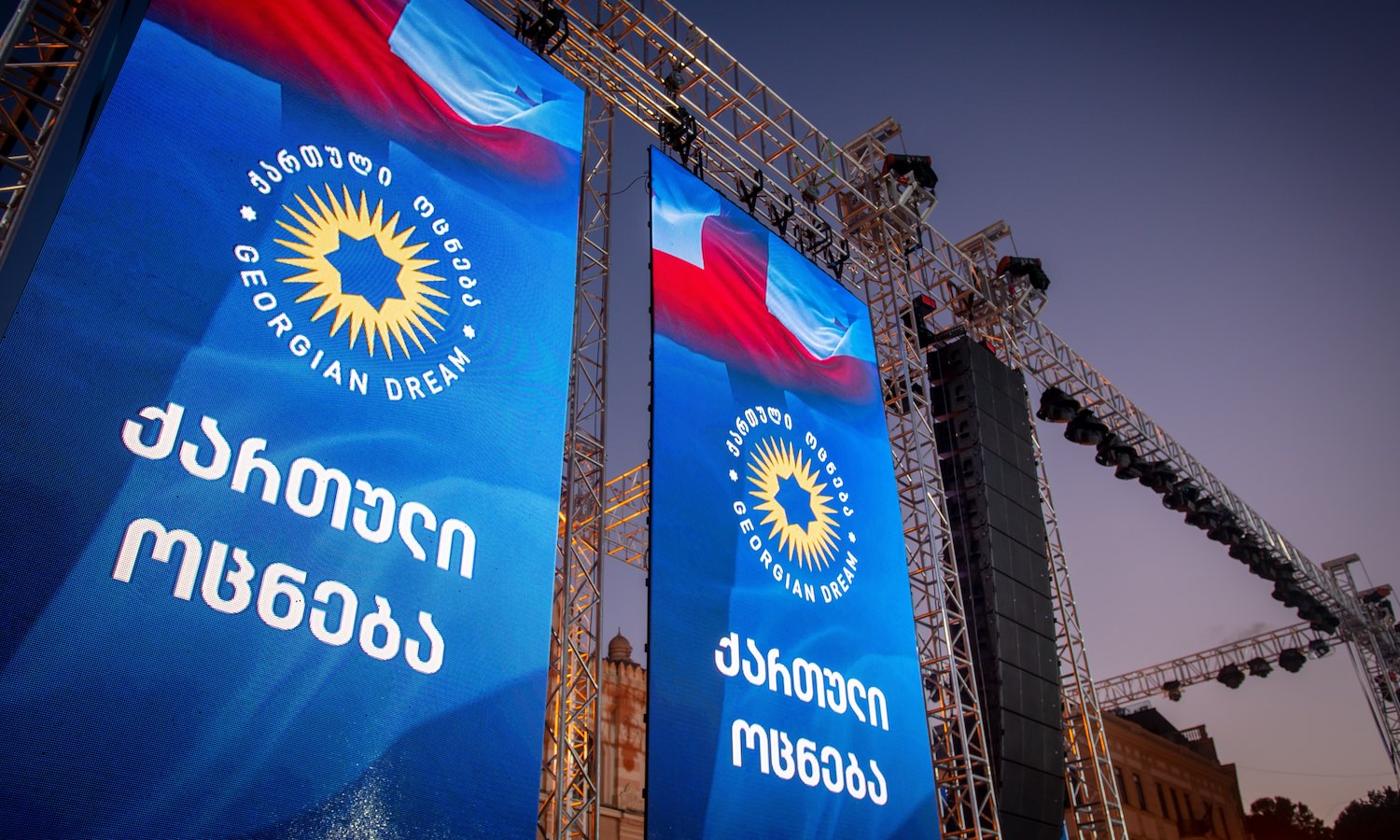Standing teary-eyed on the mace-soaked streets of Tbilisi, Georgia last summer, it was hard to figure that the months of unrest stemmed from an esoteric fiscal policy.
The policy, commonly dubbed the Foreign Agents Law, placed severe reporting requirements on nongovernmental organizations (NGOs) receiving funding from abroad. Its August 2024 enactment sparked more than 200 consecutive days of ongoing nationwide protest against the ruling Georgian Dream party.
Indeed, Georgians understood what U.S. Democrats still may not: NGOs provide a critical barrier to authoritarian state capture. In Georgia, the Georgian Young Lawyers’ Association helped document electoral fraud in 2003, delegitimizing results and catalyzing the pro-democracy Rose Revolution. In the United States, the NAACP Legal Defense Fund played a similar role in the mid-20th century, litigating the liberalization of the Jim Crow South and its constituent one-party authoritarian enclaves. The democratizing influence of empowered civil society spans vastly divergent contexts.
Faced with resurgent backsliding, pro-democracy forces in the U.S. should take action to protect our healthy, dissent-rich civil society, a vulnerable but fundamental defense at which the Trump administration has already bared its teeth.
I landed in Tbilisi before the pandemonium of the second Trump administration, just as the anti-Western Georgian Dream was first making its authoritarian ambitions better known. Keen on adventure, I took a gamble and accepted a fellowship with Harvard’s Davis Center for Russian and Eurasian Studies to work at a small nongovernmental research outfit called the Georgian Institute of Politics (GIP) in 2023. My assignment was a research project on Georgia’s attempts to join NATO, scurrying between Parliament and defense offices to assess the status of a partnership that was shaky then and lies in shambles now.
Even under Soviet-style illiberalism, Tbilisi stubbornly retains a quasi-Western dazzle, as if 1990s Berlin were parachuted onto a Silk Road trading post. The after-dark scene—some in the European nightlife milieu regard Tbilisi’s Bassiani as the continent’s top club after Berlin’s Berghain—represents the stronghold of the youthful opposition movement. Indeed, Georgia’s most famed nightclubs shuttered en masse at the nascence of anti-government protests in December 2024 to encourage taking part in street protests. And set against Tbilisi’s iconoclastic modernity, fortresses dating to the 4th century dot the city’s perimeter, witness not only to current unrest, but to past tribulations of the Byzantine, Seljuk, Persian, Arab, Umayyad, Mongol, Iranian, and Russian empires.
I fell enamored with Georgians’ determination to protect this careful equilibrium of avant-garde and ancient, a resolve ongoing for centuries and manifested today in the opposition to a pro-Russian government that many believe undermines their heritage.
By contrast, a Europe-aligned future affirms their vision. At the UEFA European Under-21 Championship soccer matches in Tbilisi, my Georgian friends and I cheered Sakartvelo, the country’s endonym, as Georgia took down a heavily favored Portugal squad. We listened to Western music at a formerly abandoned Soviet sewing factory. We tasted traditional wines at the Badagoni vineyard in Kakheti. (The upper echelon of Georgian winemakers still produces vintages in underground clay pots, reasserting their unique heritage while still earning the respect of the old guard in Bordeaux and Burgundy.) Georgia could be considered the wayward cousin of Western Europe, fluent in familiar traditions but steeped in older, wilder myths. Still, family is family.
Together with a band of eager hometown buddies, I feasted on khinkali dumplings, drank grape brandy (“chacha”), went on language-barriered dates, and built genuine friendships. The notion that my family back home was worried—Russia invaded Georgia via its northern border less than 20 years ago—felt preposterous to an awestruck college junior.
Even in 2023, however, democratic decay had picked up momentum. One evening, I was the last person in the GIP office building, stubbornly transcribing an interview at dusk. On the way out, I forgot to lock the door. The next morning, I arrived to find the staff in distress. To my colleagues, the unlocked door was evidence of break-in, signifying that a Georgian Dream operative had rummaged through the office, perhaps to steal documents or technology, or to gather information on the individuals working there. Though it was generously forgiven, the moment was not only a reminder of the stakes of my work, but a sobering testament to the capacity of autocrats to chill civil society before lifting a legislative finger.
Today, the Georgian Dream’s NGO-hunting tactics have grown more tangible. Emboldened by a highly controversial election in October 2024, empowered by its Russia-tied billionaire founder Bidzina Ivanishvili, and legitimized by a corrupt judiciary, the government rammed its Foreign Agents Law into effect. Opposition parties had little statutory recourse.
Indeed, the GIP suspended its activities this summer. It is hard for me to visualize those bustling desks vacant. But freedoms shrink once labeled a foreign agent.
Of course, this is not the first time that NGOs have served as a coal-mine canary for authoritarian capture. Once those skeptical of dissent identify them as anti-government, NGOs become uniquely vulnerable. Russia passed similar legislation in 2012, and two years later a third of all NGOs in the country had closed down. One can hardly argue that democracy and transparency in Russia have since gained ground.
Less attention has fallen on similar efforts in the United States. The Trump administration and its allies have vilified nonprofits in both their rhetoric and policy, stemming back to the Heritage Foundation’s Project 2025, which articulated measures against NGOs involved in immigration, climate change, and reproductive health. In June, the congressional Subcommittee on Delivering on Government Efficiency held a hearing subtitled “NGOs Gone Wild,” purporting to “expose how radical Democrats have funneled billions of taxpayer dollars to nongovernmental organizations.” Shortly thereafter, Reps. Marjorie Taylor Green (R-Ga.) and Josh Hawley (R-Mo.) initiated separate investigations into hundreds of immigrant-rights nonprofits. These measures have coincided with President Trump’s crusade against the sectors of civil society beyond NGOs that are a check on his power, including Ivy League universities, law firms, and public broadcasters.
Fortunately, there would have been little tumult had I left Harvard’s front door unlocked before my graduation last May, despite President Trump’s high-profile efforts to kneecap the county’s oldest university. Still, recent developments evoked Tbilisi: Harvard has rebranded its diversity, equity, and inclusion (DEI) messaging for terms like “community and campus life” and razed the College’s diversity offices, reassigning support for minority, LGBTQ, and female students to the new Harvard Foundation. The self-directed kowtowing emulates my suspended former workplace’s fear of the omnipresent Georgian Dream.
Meanwhile, our Republican-controlled Congress has tools to directly constrict civil society. By amending the legal definition of “charitable activities” in the Internal Revenue Code, it could disqualify whole classes of nonprofit work from 501(c)(3) tax-exempt status. This is no abstract concern; nonprofits’ survival is tethered to this designation. The House already passed a “Nonprofit Killer” bill in November 2024, which would authorize the Treasury Secretary to unilaterally investigate and suspend nonprofits over allegations of support for terrorism, even without proof of wrongdoing. If the president succeeds in using the bully pulpit to push his anti-democratic edicts through the Senate, or worse, weaponizes the charitable-use doctrine to define political disagreement as disqualifying, it would constitute another erasure of dissent by an authoritarian government bent on consolidating its power.
Democrats should meet force with structure. At the state level, blue legislatures and governors could establish nonprofit stabilization funds, modeled after the American Rescue Plan, to backfill grant losses for groups targeted by political investigations. Democratic attorneys general must preemptively litigate against attempts to politicize the “charitable activities” definition and coordinate pro bono legal defense networks for at-risk organizations. Meanwhile, party-aligned donors and philanthropic intermediaries should build pooled rapid-response funds and flexible legal entities to route emergency funding when 501(c)(3) status is threatened. Quiet structural preparation now beats reactive outcry later.
To be clear, authoritarian governments aren’t delusional in viewing NGOs as adversaries. Georgia’s Foreign Agents Law has worked on its own terms: It is battering foreign-funded organizations, many of which bolstered democratic institutions and monitored election interference. American NGOs, too, often advance values unpopular with Republicans, like DEI, climate investment, and racial equity. But their function is not political popularity. It is ballast without which democracy capsizes.
Georgians continue to fight for their civil society because they know the alternative. Free-speech and democracy advocates in the U.S. would be wise to act now.
Peter N. Jones is a researcher at the Harvard Kennedy School and a postgraduate student at the University of Oxford, where he is a C. Douglas Dillon Scholar. A recent graduate of Harvard College, he completed two research fellowships in Tbilisi, Georgia.







0 Comments